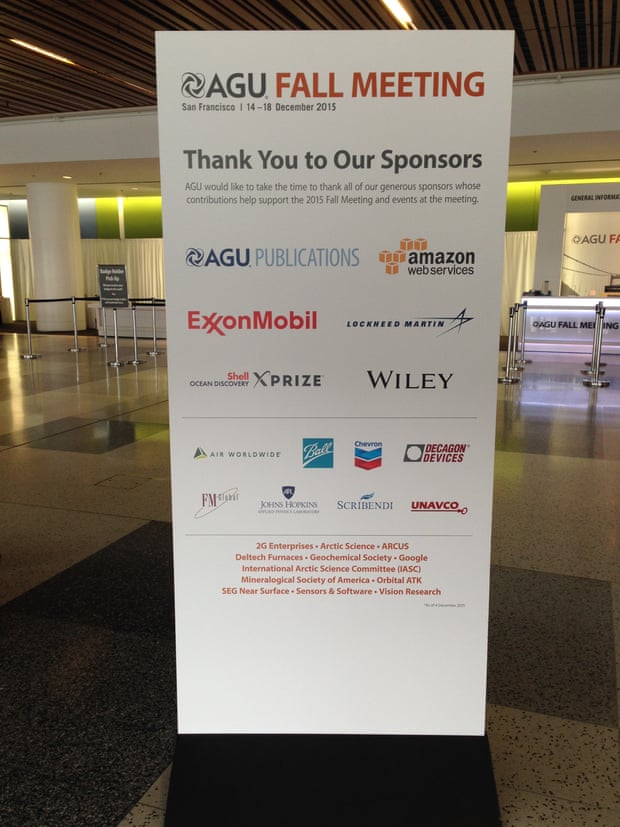
Ploy Achakulwisut is a PhD candidate in atmospheric chemistry at Harvard University. Ben Scandella is a PhD candidate in environmental science at MIT. Britta Voss earned a PhD in Earth science from MIT and the Woods Hole Oceanographic Institution.
“Thank You to Our Sponsors: ExxonMobil, Chevron, Shell...” This was the first message to greet us upon arrival at the 2015 American Geophysical Union (AGU) fall meeting - the world’s largest gathering of Earth and space scientists.

AGU 2015 fall meeting “Thank you to our sponsors” board.
As aspiring and early career environmental scientists, this was a dismaying welcome, for we are immensely disturbed and angered by the well-documented complicity of these companies in climate denial and disinformation. For example, recent investigative journalism has shed light on the fact that ExxonMobil,informed by their in-house scientists, has known about the devastating global warming effects of fossil fuel burning since the late 1970s, but spent the next decades funding disinformation campaigns to confuse the public, slander scientists, and sabotage science - the very science conducted by thousands of AGU members. Even today, ExxonMobil and Chevron continue to fund the American Legislative Exchange Council, a lobbying group that routinely misrepresents climate science to US state legislators and attempts to block pro-renewable energy policies.
The impacts of Exxon’s tactics have been devastating. Thanks in part to Exxon, the American public remains confused and polarized about climate change. Thanks in part to Exxon, climate science-denying Republicans in Congress and lobby groups operating at the state level remain a major obstacle to U.S. efforts to mitigate climate change.
And thanks in no small part to Exxon, climate action has been delayed at the global level; as the international community began to consider curbing greenhouse gas emissions with the Kyoto Protocol in 1997, Exxon orchestrated and funded anti-Kyoto campaigns, including participation in the Global Climate Coalition. The latter was so successful at shifting debate that the George W. Bush administration credited it with playing a key role in its rejection of the Kyoto Protocol.
Yet throughout the week-long conference of Earth scientists, Exxon was promoted as an excellent career option. The geoscience professionals showcase - an “opportunity to talk with featured employers” - proudly included Exxon. In a series of career advice workshops on transitioning beyond academia, our speaker more than once named Exxon as a potential employer in her hypothetical case studies, whereas cigarette company Benson & Hedges was derisively put forward as an example recruiter we’d never dream of accepting.
As the week drew to an end, we were left to wonder why it is that at the largest convergence of Earth and climate scientists, the hosting organization would seemingly engage in a serious conflict of interest by enthusiastically accepting support from companies that actively undermine the work of many of its members. Or why, if it’s now taboo to work for tobacco companies because they deceived the public about the dangers of smoking, the next generation of Earth science scholars still finds encouragement in pursuing careers in the fossil fuel industry, which continues to twist truths about climate change.
Some may argue that Exxon atones for its wrongdoings in other ways, but its actions are invariably in bad faith. For example, the company has never put its weight behind a carbon tax despite claims of support for the concept. It is the very disingenuousness of Exxon’s ways that makes their greenwashing efforts - like sponsoring AGU - so crucial to their survival.
AGU states that its mission and core values are to “promote discovery in Earth science for the benefit of humanity” and for “a sustainable future.” But by allowing Exxon to appropriate AGU’s institutional social license to help legitimize the company’s climate disinformation, and by granting it the privilege to recruit from AGU’s own cohort of emerging scholars, AGU is undermining the work of its own members.
The issue of career paths also raises a deeper question that we as a community must address - however uncomfortable - as to why we are still promoting the training and recruitment of the next generation of scientists to develop future technologies and methods for discovering more oil and gas reserves, when science has told us that no more than one third of existing reserves can be burned to avoid dangerous climate change.
Posted by Guest Author on Wednesday, 6 January, 2016
 |
The Skeptical Science website by Skeptical Science is licensed under a Creative Commons Attribution 3.0 Unported License. |